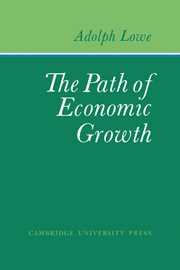Book contents
- Frontmatter
- Contents
- Preface
- Acknowledgments
- PART I The Basic Model
- PART II Changes in the Rate of Change
- PART III Changes in the Rate of Change
- 19 The Dynamics of Diminishing Returns
- 20 Recycling of Production and Consumption Residuals and the Structure of Production
- PART IV Changes in the Rate of Change
- Appendix: An Alternative Presentation of Lowe's Basic Model
- Glossary of Recurring Symbols
- Name Index
- Subject Index
20 - Recycling of Production and Consumption Residuals and the Structure of Production
Published online by Cambridge University Press: 07 October 2011
- Frontmatter
- Contents
- Preface
- Acknowledgments
- PART I The Basic Model
- PART II Changes in the Rate of Change
- PART III Changes in the Rate of Change
- 19 The Dynamics of Diminishing Returns
- 20 Recycling of Production and Consumption Residuals and the Structure of Production
- PART IV Changes in the Rate of Change
- Appendix: An Alternative Presentation of Lowe's Basic Model
- Glossary of Recurring Symbols
- Name Index
- Subject Index
Summary
The rapidly rising concern with the ecological effects of industrial production and of the consumption style of modern life has so far found little resonance in economic theory. It has now been more than fifty years since Pigou called attention to the importance of “externalities” and, in particular, of diseconomies afflicting the general public, which arise from actions that benefit individual actors. In the tradition of his reasoning, it is still the partial equilibrium aspect and the emphasis on the “bads” rather than the “goods” emanating from such actions that dominate the discussion of these issues.
In a remarkable paper, Ayres and Kneese have broken with this tradition. They present a general equilibrium model of the “material balance” approach to the production and disposal of residuals, with special regard to their recycling into newly usable resources. The following exposition will move along similar lines, but with two notable differences. First, our interest centers on the possibility of emancipating ourselves from the dependence on a given stock of natural resources and, thus, on the potential benefits that can be reaped from the proper treatment of production and consumption residuals. Second, rather than relating the recycling process to the Walrasian model of general equilibrium, which is the starting point of Ayres and Kneese, we shall try to incorporate the process of retransforming residuals into “artificial” resources as another circular flow in our original schema of production.
Information
- Type
- Chapter
- Information
- The Path of Economic Growth , pp. 223 - 232Publisher: Cambridge University PressPrint publication year: 1976
